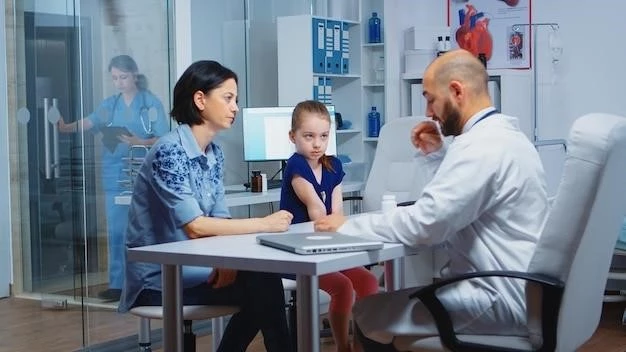Familial Dilated Cardiomyopathy
Introduction
Familial dilated cardiomyopathy (FDC) is a genetic disorder characterized by the weakening and enlargement of the heart muscle, leading to heart failure․ Unlike acquired forms of the condition, FDC is inherited, meaning it runs in families․ This condition can affect both adults and children, with varying degrees of severity․
Understanding FDC is crucial as it impacts not only the individuals diagnosed with the condition but also their close relatives who may be at risk of inheriting the genetic mutation․ Early detection and management are essential in improving the prognosis and quality of life for individuals with FDC․
This article will delve into the causes, risk factors, symptoms, diagnosis, treatment options, prognosis, and lifestyle changes necessary for the effective management of familial dilated cardiomyopathy;
Understanding Familial Dilated Cardiomyopathy
Familial dilated cardiomyopathy (FDC) is a form of heart muscle disease that affects the ventricular chambers of the heart․ In individuals with FDC, the heart muscle becomes weakened and dilated, leading to impaired heart function․
This condition is caused by genetic mutations that disrupt the normal structure and function of the heart muscle cells․ These mutations are inherited from one or both parents, making FDC a hereditary condition․

Individuals with FDC may have a higher risk of developing heart failure, where the heart cannot pump blood efficiently to meet the body’s needs․ Understanding the genetic basis of FDC is essential for identifying at-risk family members and implementing preventive measures․
Research into the genetic underpinnings of FDC continues to shed light on the intricate mechanisms that contribute to the development and progression of this condition․ Advances in genetic testing have enabled healthcare providers to diagnose FDC earlier, allowing for timely interventions to prevent complications․
By understanding the genetic and molecular pathways involved in FDC, researchers are also exploring innovative treatment approaches such as gene therapy, which aims to correct the underlying genetic defects responsible for the disease․ This emerging field holds promise for personalized and targeted therapies for individuals with familial dilated cardiomyopathy․
Causes and Risk Factors
The primary cause of familial dilated cardiomyopathy (FDC) is genetic mutations that affect the structure and function of the heart muscle․ These mutations are passed down from parents to their children, making FDC an inherited condition․ The genetic variants associated with FDC can vary, leading to differences in disease severity and progression among affected individuals․
While genetic factors play a predominant role in the development of FDC, other risk factors can influence the manifestation of the condition․ Environmental factors such as exposure to toxins, viral infections, and certain medications may interact with genetic predispositions, further increasing the risk of developing FDC․
Specific gene mutations linked to FDC can impact the contractility of the heart muscle cells, impairing the heart’s ability to pump blood effectively․ These genetic abnormalities can also affect the structural integrity of the heart chambers, leading to dilation and dysfunction․
Individuals with a family history of FDC are at a higher risk of inheriting the genetic mutation and developing the condition․ Close relatives of individuals diagnosed with FDC should undergo genetic counseling and testing to assess their risk of carrying the mutation․
Understanding the interplay between genetic factors and environmental influences is crucial in determining an individual’s susceptibility to FDC․ By identifying and addressing these risk factors, healthcare providers can implement personalized strategies to mitigate the progression of the disease and improve outcomes for individuals with familial dilated cardiomyopathy․
Symptoms of Familial Dilated Cardiomyopathy
Individuals with familial dilated cardiomyopathy (FDC) may experience a range of symptoms that reflect the impaired function of the heart muscle․ These symptoms can vary in severity and may worsen over time as the condition progresses․
Common symptoms of FDC include shortness of breath, especially during physical activities or when lying flat, fatigue, weakness, and dizziness․ Some individuals may also experience swelling in the legs, ankles, or abdomen due to fluid retention caused by heart failure․
As FDC affects the heart’s ability to pump blood efficiently, affected individuals may develop palpitations, irregular heartbeats, and chest pain․ These symptoms can significantly impact daily life and quality of life, warranting timely medical intervention․
In severe cases of familial dilated cardiomyopathy, individuals may present with symptoms of advanced heart failure, such as severe shortness of breath even at rest, persistent coughing or wheezing, and significant weight gain from fluid retention․
It is essential for individuals experiencing any of these symptoms, especially those with a family history of FDC, to seek prompt medical evaluation․ Early detection and management of familial dilated cardiomyopathy can help alleviate symptoms, slow disease progression, and improve overall prognosis․
Diagnosis of the Disease
Diagnosing familial dilated cardiomyopathy (FDC) involves a comprehensive evaluation that includes a thorough medical history, physical examination, and various diagnostic tests․ Given that FDC is a genetic disorder, a detailed family history is crucial in identifying individuals at risk․
Genetic testing plays a significant role in the diagnosis of FDC, allowing healthcare providers to identify specific gene mutations associated with the condition․ Testing for known genetic variants associated with FDC can help confirm the diagnosis in affected individuals and guide genetic counseling for at-risk family members․
Imaging studies such as echocardiography, cardiac MRI, and CT scans are used to assess the structure and function of the heart, identifying abnormalities such as ventricular dilation and reduced cardiac output characteristic of FDC․ These non-invasive tests provide valuable information for the diagnosis and management of the disease․
Electrocardiograms (ECG) and Holter monitoring may be employed to evaluate the electrical activity of the heart and detect any irregularities in heart rhythm․ Additionally, stress tests and cardiac catheterization may be performed to assess the heart’s response to physical exertion and evaluate coronary artery function․
A multidisciplinary approach involving cardiologists, genetic counselors, and other healthcare professionals is essential for the accurate diagnosis of familial dilated cardiomyopathy․ Early detection of FDC allows for timely intervention and the implementation of targeted treatment strategies to improve outcomes for affected individuals and their families․
Treatment Options
The management of familial dilated cardiomyopathy (FDC) focuses on reducing symptoms, slowing disease progression, and improving overall heart function․ Treatment options for individuals with FDC aim to address the underlying genetic defects, manage heart failure symptoms, and reduce the risk of complications․
Medications such as angiotensin-converting enzyme (ACE) inhibitors, beta-blockers, and diuretics are commonly prescribed to improve heart function, lower blood pressure, and reduce fluid retention in individuals with FDC․ These medications can help alleviate symptoms and enhance quality of life․
In some cases, individuals with FDC may require implantable devices such as pacemakers or defibrillators to regulate heart rhythm and prevent life-threatening arrhythmias․ These devices play a crucial role in managing cardiac function and reducing the risk of sudden cardiac death․
For individuals with advanced FDC and severe heart failure, heart transplantation may be considered as a treatment option․ Heart transplantation can provide a new lease on life for individuals with end-stage FDC by replacing the failing heart with a healthy donor heart․
Emerging therapies such as gene therapy hold promise for the treatment of familial dilated cardiomyopathy by targeting the underlying genetic mutations responsible for the condition․ Gene therapy aims to correct genetic defects, restore normal heart function, and potentially halt disease progression in affected individuals․
It is essential for individuals with FDC to work closely with a team of healthcare providers, including cardiologists, genetic counselors, and other specialists, to develop a personalized treatment plan tailored to their specific needs․ Regular monitoring and follow-up care are critical in managing familial dilated cardiomyopathy effectively and optimizing long-term outcomes․
Prognosis and Outlook
The prognosis for individuals with familial dilated cardiomyopathy (FDC) varies depending on several factors, including the severity of the condition, the presence of complications, and the effectiveness of treatment․ While FDC is a serious and potentially life-threatening condition, early diagnosis and intervention can significantly improve outcomes and quality of life․
With advances in medical management and treatment options, many individuals with FDC can lead fulfilling lives and effectively manage their symptoms․ Timely initiation of medications, lifestyle modifications, and close monitoring are crucial in stabilizing heart function and preventing disease progression․
Regular follow-up appointments with healthcare providers are essential for monitoring the effectiveness of treatment, adjusting medications as needed, and addressing any new symptoms or complications that may arise․ Genetic counseling can also help individuals and their families understand the hereditary nature of FDC and make informed decisions about genetic testing and family planning․
In cases where heart transplantation is necessary, the prognosis for individuals with end-stage FDC can be significantly improved, offering a new chance at life and enhanced long-term survival․ However, the decision to undergo heart transplantation should be carefully considered in consultation with a transplant team․
Research into new treatment modalities, such as gene therapy and stem cell therapy, continues to advance, offering hope for future breakthroughs in the management of familial dilated cardiomyopathy․ These innovative therapies aim to target the root cause of FDC by addressing genetic mutations and restoring normal heart function․
Overall, the prognosis for individuals with FDC is influenced by early detection, prompt intervention, adherence to treatment regimens, and lifestyle changes․ By actively managing the condition in collaboration with healthcare providers, individuals with familial dilated cardiomyopathy can optimize their prognosis and lead fulfilling lives despite the challenges posed by this genetic heart disorder․
Lifestyle Changes for Management
Adopting healthy lifestyle habits is vital for the effective management of familial dilated cardiomyopathy (FDC) and improving overall heart health․ Lifestyle modifications can complement medical treatment, minimize symptoms, and enhance the quality of life for individuals with FDC․
- Regular Exercise⁚ Engaging in regular physical activity can help strengthen the heart muscle, improve circulation, and boost overall cardiovascular health․ It is essential to consult with a healthcare provider to develop a safe and suitable exercise plan․
- Heart-Healthy Diet⁚ Following a heart-healthy diet rich in fruits, vegetables, whole grains, lean proteins, and limited saturated fats can support heart function and reduce the risk of complications associated with FDC․
- Weight Management⁚ Maintaining a healthy weight is crucial for individuals with FDC, as excess weight can strain the heart and exacerbate symptoms․ A balanced diet and regular exercise can help achieve and sustain a healthy weight․
- Smoking Cessation⁚ Smoking poses significant risks for individuals with FDC, as it can worsen heart function and increase the likelihood of cardiovascular complications․ Quitting smoking is essential for improving heart health․
- Stress Management⁚ Chronic stress can negatively impact heart health and exacerbate symptoms of FDC․ Implementing stress-reducing techniques such as mindfulness, meditation, and relaxation exercises can promote emotional well-being․
- Limited Alcohol Intake⁚ Excessive alcohol consumption can have adverse effects on heart function and should be limited for individuals with FDC․ Healthcare providers may recommend moderation or abstinence from alcohol․
- Regular Monitoring⁚ Keeping track of blood pressure, weight, and symptoms of heart failure can help individuals with FDC and their healthcare providers assess the effectiveness of treatment and make necessary adjustments․
- Social Support⁚ Building a strong support network of family, friends, and healthcare professionals can be invaluable for individuals coping with FDC․ Emotional support and encouragement can positively impact the management of the condition․
By incorporating these lifestyle changes into their daily routine, individuals with familial dilated cardiomyopathy can enhance their heart health, manage symptoms effectively, and improve their overall well-being․ It is essential to work collaboratively with healthcare providers to develop a comprehensive care plan that addresses both medical treatment and lifestyle modifications for optimal management of FDC․
